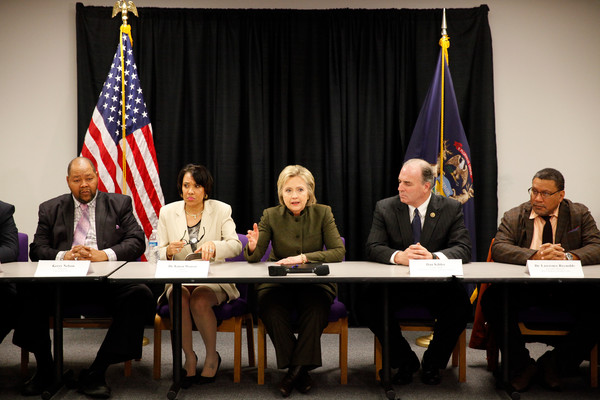SECRETARY CLINTON:Thank you very much, Mr. Chairman, Senator Lugar. After both of your opening comments, I think you’ve made the case both eloquently and persuasively for anyone who is willing to look at the facts. I am well aware that this treaty does have determined opposition, limited but nevertheless quite vociferous. And it’s unfortunate because it’s opposition based in ideology and mythology, not in facts, evidence, or the consequences of our continuing failure to accede to the treaty. So I think you’ll hear, from both Secretary Panetta and General Dempsey as well as myself, further statements and information that really reinforces the very strong points that both of you have made.We believe that it is imperative to act now. No country is better served by this convention than the United States. As the world’s foremost maritime power, we benefit from the convention’s favorable freedom of navigation provisions. As the country with the world’s second longest coastline, we benefit from its provisions on offshore natural resources. As a country with an exceptionally large area of seafloor, we benefit from the ability to extend our continental shelf, and the oil and gas rights on that shelf. As a global trading power, we benefit from the mobility that the convention accords to all commercial ships. And as the only country under this treaty that was given a permanent seat on the group that will make decisions about deep seabed mining, we will be in a unique position to promote our interests.
Now, the many benefits of this convention have attracted a wide-ranging coalition of supporters. Obviously, as we heard from both Senator Kerry and Senator Lugar, Republican and Democratic presidents have supported U.S. accession; military leaders who see the benefits for our national security; American businesses, including, strongly, the U.S. Chamber of Commerce, see the economic benefits. It has the support of every affected industry, including shipping, fisheries, telecommunications and energy, environmental groups as well. We have a coalition of environmental, conservation, business, industry, and security groups all in support of this convention.
And I would ask that my longer written statement along with the letters that I have received in support of the treaty be entered into the record.
CHAIRMAN KERRY: Without objection.
SECRETARY CLINTON: Now, one could argue, that 20 years ago, 10 years ago, maybe even five years ago, joining the convention was important but not urgent. That is no longer the case today. Four new developments make our participation a matter of utmost security and economic urgency.
First, for years, American oil and gas companies were not technologically ready to take advantage of the convention’s provisions regarding the extended U.S. continental shelf. Now they are. The convention allows countries to claim sovereignty over their continental shelf far out into the ocean, beyond 200 nautical miles from shore. The relevant area for the United States is probably more than 1.5 times the size of Texas. In fact, we believe it could be considerably larger.
U.S. oil and gas companies are now ready, willing, and able to explore this area. But they have made it clear to us that they need the maximum level of international legal certainty before they will or could make the substantial investments, and, we believe, create many jobs in doing so needed to extract these far-offshore resources. If we were a party to the convention, we would gain international recognition of our sovereign rights, including by using the convention’s procedures, and therefore be able to give our oil and gas companies this legal certainty. Staying outside the convention, we simply cannot.
The second development concerns deep seabed mining, which takes place in that part of the ocean floor that is beyond any country’s jurisdiction. Now for years, technological challenges meant that deep seabed mining was only theoretical; today’s advances make it very real. But it’s also very expensive, and before any company will explore a mine site, it will naturally insist on having a secure title to the site and the minerals that it will recover. The convention offers the only effective mechanism for gaining this title. But only a party to the convention can use this mechanism on behalf of its companies.
So as long as the United States is outside the convention, our companies are left with two bad choices – either take their deep sea mining business to another country or give up on the idea. Meanwhile, as you heard from Senator Kerry and Senator Lugar, China, Russia, and many other countries are already securing their licenses under the convention to begin mining for valuable metals and rare earth elements. And as you know, rare earth elements are essential for manufacturing high-tech products like cell phones and flat screen televisions. They are currently in tight supply and produced almost exclusively by China. So while we are challenging China’s export restrictions on these critical materials, we also need American companies to develop other sources. But as it stands today, they will only do that if they have the secure rights that can only be provided under this convention. If we expect to be able to manage our own energy future and our need for rare earth minerals, we must be a party to the Law of the Sea Convention.
The third development that is now urgent is the emerging opportunities in the Arctic. As the area gets warmer, it is opening up to new activities such as fishing, oil and gas exploration, shipping, and tourism. This convention provides the international framework to deal with these new opportunities. We are the only Arctic nation outside the convention. Russia and the other Arctic states are advancing their continental shelf claims in the Arctic while we are on the outside looking in. As a party to the convention, we would have a much stronger basis to assert our interests throughout the entire Arctic region.
The fourth development is that the convention’s bodies are now up and running. The body that makes recommendations regarding countries’ continental shelves beyond 200 nautical miles is actively considering submissions from over 40 countries without the participation of a U.S. commissioner. The body addressing deep seabed mining is now drawing up the rules to govern the extraction of minerals of great interest to the United States and American industry. It simply should not be acceptable to us that the United States will be absent from either of those discussions.
Our negotiators obtained a permanent U.S. seat on the key decision-making body for deep seabed mining. I know of no other international body that accords one country and one country alone – us – a permanent seat on its decision making body. But until we join, that reserved seat remains empty.
So those are the stakes for our economy. And you will hear from Secretary Panetta and General Dempsey that our security interests are intrinsically linked to freedom of navigation. We have much more to gain from legal certainty and public order in the world’s oceans than any other country. U.S. Armed Forces rely on the navigational rights and freedoms reflected in the convention for worldwide access to get to combat areas, sustain our forces during conflict, and return home safely all without permission from other countries.
Now as a non-party to the convention, we rely – we have to rely – on what is called customary international law as a legal basis for invoking and enforcing these norms. But in no other situation at which – in which our security interests are at stake do we consider customary international law good enough to protect rights that are vital to the operation of the United States military. So far we’ve been fortunate, but our navigational rights and our ability to challenge other countries’ behavior should stand on the firmest and most persuasive legal footing available, including in critical areas such as the South China Sea.
I’m sure you have followed the claims countries are making in the South China Sea. Although we do not have territory there, we have vital interests, particularly freedom of navigation. And I can report from the diplomatic trenches that as a party to the convention, we would have greater credibility in invoking the convention’s rules and a greater ability to enforce them.
Now, I know a number of you have heard arguments opposing the convention. And let me just address those head-on. Critics claim we would surrender U.S. sovereignty under this treaty. But in fact, it’s exactly the opposite. We would secure sovereign rights over vast new areas and resources, including our 200-mile exclusive economic zone and vast continental shelf areas extending off our coasts and at least 600 miles off Alaska. I know that some are concerned that the treaty’s provisions for binding dispute settlement would impinge on our sovereignty. We are no stranger to similar provisions, including in the World Trade Organization which has allowed us to bring trade cases; many of them currently pending against abusers around the world. As with the WTO, the U.S. has much more to gain than lose from this proposition by being able to hold others accountable under clear and transparent rules.
Some critics invoke the concern we would be submitting to mandatory technology transfer and cite President Reagan’s other initial objections to the treaty. Those concerns might have been relevant decades ago, but today they are not. In 1994, negotiators made modifications specifically to address each of President Reagan’s objections, including mandatory technology transfer, which is why President Reagan’s own Secretary of State, George Shultz, has since written we should join the convention in light of those modifications having been made.
Now some continue to assert we do not need to join the convention for U.S. companies to drill beyond 200 miles or to engage in deep seabed mining. That’s not what the companies say. So I find it quite ironic, in fact somewhat bewildering that a group, an organization, an individual would make a claim that is refuted by every major company in every major sector of the economy who stands to benefit from this treaty. Under current circumstances, they are very clear. They will not take on the cost and risk these activities under uncertain legal frameworks. They need the indisputable, internationally recognized rights available under the treaty. So please, listen to these companies, not to those who have other reasons or claims that are not based on the facts. These companies are refuting the critics who say, “Go ahead, you’ll be fine.” But they’re not the ones – the critics – being asked to invest tens of millions of dollars without the legal certainty that comes with joining the convention.
Now some mischaracterize the payments for the benefit of resource rights beyond 200 miles as quote “a UN tax” – and this is my personal favorite of the arguments against the treaty – that will be used to support state sponsors of terrorism. Honestly, I don’t know where these people make these things up, but anyway the convention does not contain or authorize any such taxes. Any royalty fee does not go to the United Nations; it goes into a fund for distribution to parties of the convention. And we, were we actually in the convention, would have a permanent veto power over how the funds are distributed. And we could prevent them from going anywhere we did not want them to go. I just want to underscore – this is simple arithmetic. If we don’t join the convention, our companies will miss out on opportunities to explore vast areas of continental shelf and deep seabed. If we do join the convention, we unlock economic opportunities worth potentially hundreds of billions of dollars, for a small percentage royalty a few years down the line.
I’ve also heard we should not join this convention because quote “it’s a UN treaty.” And of course that means the black helicopters are on their way. Well, the fact that a treaty was negotiated under the auspices of the United Nations, which is after all a convenient gathering place for the countries of the world, has not stopped us from joining agreements that are in our interests. We are a party to dozens of agreements negotiated under the UN auspices on everything from counter-terrorism and law enforcement to health, commerce, and aviation. And we often pay fees under those treaties recognizing the benefits we get dwarf those minimal fees.
And on the national security front, some argue we would be handing power over the U.S. Navy to an international body. Patently untrue, obviously absolutely contrary to any history or law governing our navy. None of us would be sitting here if there were even a chance that you could make the most absurd argument that could possibly lead to that conclusion. Disputes concerning U.S. military activities are clearly excluded from dispute settlement under the convention.
And neither is it true that the convention would prohibit intelligence activities. The intelligence community has once again in 2012, as it did in 2007, as it did in 2003, confirmed that is absolutely not true.
So whatever arguments may have existed for delaying U.S. accession no longer exist and truly cannot be even taken with a straight face. The benefits of joining have always been significant, but today the costs of not joining are increasing. So much is at stake, and I therefore urge the Committee to listen to the experts, listen to our businesses, listen to the Chamber of Commerce, listen to our military, and please give advice and consent to this treaty before the end of this year. Thank you, Mr. Chairman.
This slideshow requires JavaScript.



 Hillary Clinton met with Chinese Foreign Minister Yang Jiechi, at the Ministry of Foreign Affairs in Beijing Tuesday. Jim Watson/AP
Hillary Clinton met with Chinese Foreign Minister Yang Jiechi, at the Ministry of Foreign Affairs in Beijing Tuesday. Jim Watson/AP
































